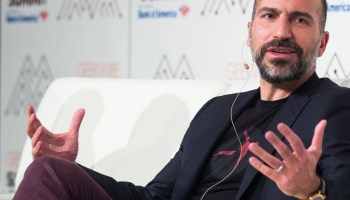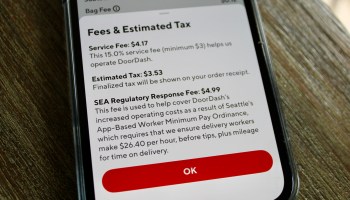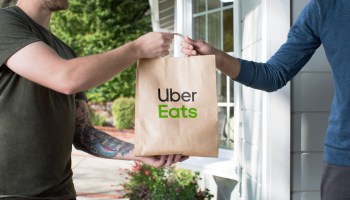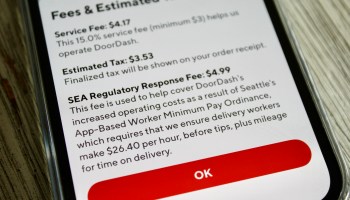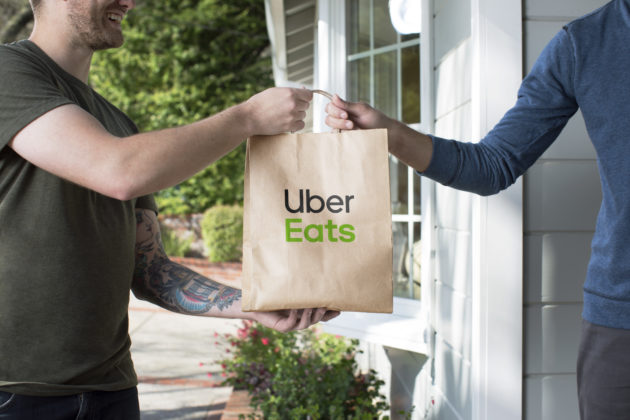
New legislation that would lower recently implemented minimum wage standards for Uber Eats and DoorDash delivery drivers in Seattle took another step forward on Thursday.
The Seattle City Council’s governance, accountability, and economic development committee approved the new ordinance, which will now move to a full council vote on May 28.
Since the existing minimum pay law went into effect in January, tech giants including Uber and DoorDash responded by adding new fees for consumers, which caused demand to drop considerably. They also amped up lobbying efforts at City Hall, and their chief executive officers spoke against the law in response to questions from analysts on earnings calls.
Last month, Seattle City Council President Sara Nelson introduced new legislation that lowers the minimum wage standard for drivers from $26.40 to $19.97, in addition to other changes from the existing law.
The current law is “clearly not working,” Nelson said on Thursday. She said the new legislation is an “effort to reverse the bad outcomes caused by a flawed law and catalyzed by network companies imposing a new so-called regulatory fee, which caused a drop in customer orders, a drastic reduction in worker wages, and lost revenues for restaurants and other retail establishments.”
Seattle’s citywide minimum wage for employees — delivery drivers are treated as independent contractors — is $19.97.
Working Washington, a nonprofit that helped pass the original legislation in Seattle, released a report this week showing how the new ordinance would result in net pay of $13.17 per hour, due in part to expenses such as payroll taxes and mileage costs that drivers pay for on their own.
More than 60 people spoke both in favor of and against the new ordinance during a public comment period at the meeting on Thursday, highlighting the heated debate over the first-of-its-kind regulation.
Some drivers asked the council to keep the existing pay standard because they are now making enough money to cover their rent. But several others said they were making substantially less income because of reduced demand.
“We are all trying to find a solution so that all workers are making minimum wage, rather than some and not others,” said councilmember Maritza Rivera, who is co-sponsoring the new bill. “I believe the true intent of the law was to have everyone making minimum wage. And that is not what happened in application.”
A few restaurant owners spoke in support of the new proposal, citing declining revenues from the lack of delivery orders.
“I urge the council to take swift action to prevent more irreversible economic damage to the restaurant industry in Seattle,” said Becky Yoshitani, owner of Hurry Curry.
Some speakers asked the council to focus on the consumer fees.
“These fees are what needs to be the target — not the people, not the workers … we’re fighting amongst each other because that’s what the corporations want us to do,” said Micaela Romero, a digital organizer with Washington Community Action Network.
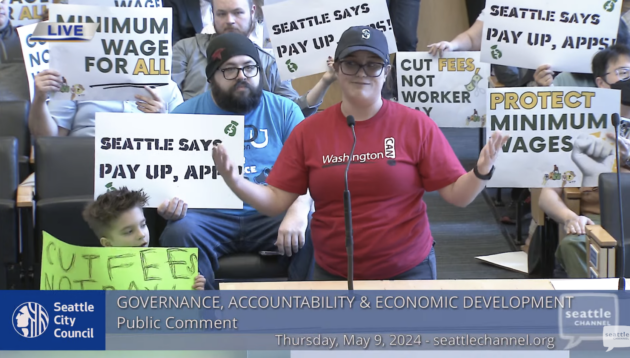
The new proposal, CB 120775, does not address fees placed on consumers.
Nelson said on Thursday that the consumer fee “has to go away.” She added: “I believe that this is still a proposal that will be acceptable for the network companies to get rid of that fee. In the future we’ll be able to see if that is in fact the case.”
Four committee members — Nelson, Rivera, Bob Kettle, and Rob Saka — voted to approve the new bill. Joy Hollingsworth abstained from voting, saying she wanted the bill “to be baked more.”
Nelson said the councilmembers could “do nothing — and then the fee stays.”
“The purchasing patterns and habits of customers will move farther and farther and farther away from using these delivery services,” she said.
She added: “When we’re talking about collecting more data and entering into a prolonged process, I just don’t see how that will help the problem at hand, which is people who are really having a hard time paying their bills right now.”
The council committee approved an amendment that gives drivers a private right of action to sue the companies, which is already in the existing law, but was initially removed from the new proposal.
It also approved an amendment that restricts companies from using incentives and bonuses to reduce earnings that would otherwise exceed minimum pay, and another amendment that restores some data production requirements for the companies.
“I want to be clear: This is not a repeal of the law,” Nelson said. “This is a reform.”
We’ve reached out to Seattle Mayor Bruce Harrell for comment. Harrell told PubliCola last week that he has a lot of “unanswered questions” about the new legislation and noted that the city needs sufficient data from the companies to “make good decisions.”
Seattle and New York City, which also recently implemented a minimum wage for delivery drivers, have become testing grounds for the impact of labor standards in a growing food delivery market facilitated by tech companies that tout the flexibility and independence offered by their platforms, but have come under scrutiny for their impact on workers and restaurants.
Seattle’s minimum wage legislation was passed in 2022. It’s part of several unique “PayUp” laws approved recently in Seattle. Other “PayUp” policies include an ordinance related to the worker deactivation process and a 10-cent per-order fee approved in November that will help fund the implementation and enforcement of the “PayUp” laws. Seattle also passed a sick leave law for delivery workers last year.
“We are encouraged to see the City Council taking this important step towards passing the proposed reform ordinance and prioritizing Seattle restaurants, delivery workers and customers that have been negatively impacted by the original law,” Uber said in a statement.
“The proposal that passed on Thursday guarantees Dashers will earn nearly $20 per hour on delivery in addition to mileage and tips,” DoorDash said in a statement. “We’re grateful that Council President Nelson and Drive Forward were able to reconvene stakeholders and reach a compromise that better serves Dashers, local businesses and consumers in Seattle.”
Story updated with statement from Uber and DoorDash.


